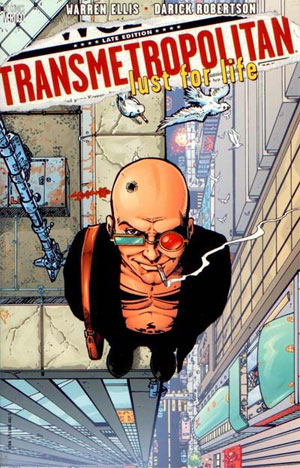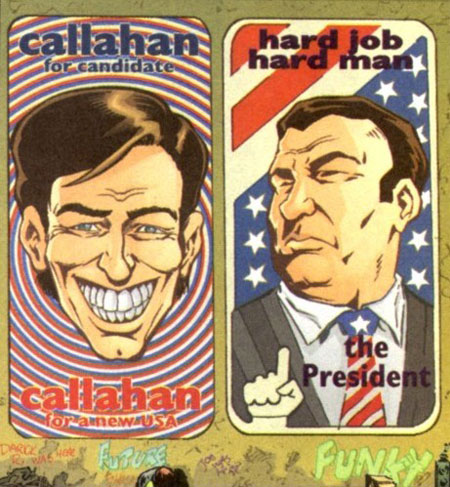Politics in Comics: Transmetropolitan
Well, the election is tomorrow. Seems like a great time to talk politics and comics again.
“Transmetropolitan” seems like an especially appropriate topic — Warren Ellis and Darick Robertson’s epic and controversial series paid more attention to the subject of presidential politics than any other comic series I’ve ever seen. Our setting was the City — that’s all, just the City — in a cyberpunk and dystopian — but still fairly funny — future. Folks are splicing themselves with alien DNA, you can go into restaurants and eat human flesh, police brutality is the expected norm, and a popular TV show focuses on puppet pornography. Everywhere you turn, there’s sex and violence and more sex and more violence. Into this urban wasteland steps our noble and incorruptible hero:
That’s Spider Jerusalem: rageoholic, atheist, misanthrope, drug abuser, frequent nudist, and righteous journalist.
No, this isn’t your typical hero — there’s a scene where he injects drugs into his eyes, he kills several people, he commits assault and battery quite casually, he hurls grenades off his apartment balcony, he propositions random women for sex, and his weapon of preference is a specialized gun called a bowel disruptor, which does pretty much what you’d expect it to do. But for all that, he’s still the most trustworthy, most moral, and generally best person in the series.
Not sure if he’s the picture-perfect journalist, but if more of them operated like Spider, maybe we’d have more politicians who’d be less willing to lie to the press. Ain’t nothing to make a politico clean up his act like being told, “I know you lied to me, so I’m going to beat you senseless with the fender from a ’58 Chrysler, then I’m going to print an article telling everyone you’re a lying bucket of yak vomit.” Heck, I’d be happy if they left out the horrible beatings, as long as they’d burn sources who lied to ’em.
Anyway, Spider sees the pursuit and revelation of The Truth as an almost religious calling, and there’s nothing that makes him madder than corruption.
Unsurprisingly, this means he runs afoul of these two guys.
Two different presidents, the Beast and the Smiler.
The Beast is a fairly petty tyrant, but at the end of the day, he’s just interested in getting through the day with himself and as many of the American people as possible alive. He’s massively corrupt, and he likes to punish people who go against him. He hates the City, and vice versa. He hates Spider, and vice versa.
In the interest of getting the Beast out of the White House, Spider initially and grudgingly supports Gary Callahan, nicknamed the Smiler because of his rigid and obviously insincere smile. Unfortunately, what Spider initially figures is just your garden-variety politician-grade neurosis is actually full-blown psychopathic megalomania — Callahan is a master manipulator and a complete sociopath. He stages riots, uses and abuses prostitutes, makes deals with really awful people. He kills multiple people, including his wife and kids, because he wants the political sympathy boost that he’d get from their deaths. He hates everyone, particularly Spider, and once elected, he makes it his primary goal to do everything he can to hurt the City, Spider, and the entire human race. In comparison, the Beast almost comes off as a good guy — that’s how rotten Gary Callahan is.
Warren Ellis is a pretty hardcore liberal. (Conservatives and squicky parents should use extreme caution in visiting his website.) It’s pretty clear that he based the Beast on Richard Nixon (though both the Beast and Callahan use Nixon’s “If the President does it, it’s not a crime” philosophy to justify their actions), but there’s quite a bit of dispute on who the Smiler is based on. Some folks think it’s George W. Bush, some folks think it’s John Edwards. I think it’s really unlikely to be Edwards, despite the similarities in appearance, just because when Ellis introduced Callahan, Edwards was a really, really minor politician. I also don’t think he’s based on Bush, for the same reason, but I also think that as the series progressed and Bush became more prominent, the Smiler became more similar to Bush. I think it’s most likely that Ellis based the Smiler on former British prime minister Tony Blair. Ellis is a Brit, after all — seems that he’d base his primary villain on a politician he was more familiar with.
Was there a deeper meaning to the series? Maybe not — part of what made “Transmetropolitan” such a great series is that it’s just a ripping yarn from beginning to end. But I do think that Ellis also believes, like Spider, that we should expect more from our politicians, that we should hold them responsible when they’re exposed as corrupt, whether we initially supported them or not, and that we should elect better people to lead us.
I dunno if Ellis gives a rat’s patoot whether or not you vote. But I do. You should go out and vote tomorrow, if you haven’t voted already, and you should care enough for your country that you give some actual thought into who deserves your vote the most. Not who yer momma wants you to vote for, not who your neighbor wants you to vote for, not who the babbling buffoons on TV want you to vote for. Vote like a grownup — like an honest grownup, not some delusional “I’ll believe whatever bulldada a politician tells me so I can feel good about myself” nitwit — and not a freakin’ sheep. Think about the choice you have to make, because it’s a pretty important choice.



Comics and Politics (or, why I love Warren Ellis’s Transmetropolitan) « WIT WAR Said,
November 3, 2008 @ 10:40 am
[…] beaten you to it. In this case, I would like to direct your attention to a fantastic article from Hero Sandwich that combines two issues that are very important to me right now: Tomorrow’s Presidential […]
Hero Sandwich » The Sick Day Lit List Said,
March 25, 2009 @ 6:10 am
[…] to you (not mentioned above)? Alan Moore, Fritz Leiber, Warren Ellis’ incredible “Transmetropolitan” comic, Agatha Christie, Raymond Chandler, Clive Barker’s “Books of Blood,” […]